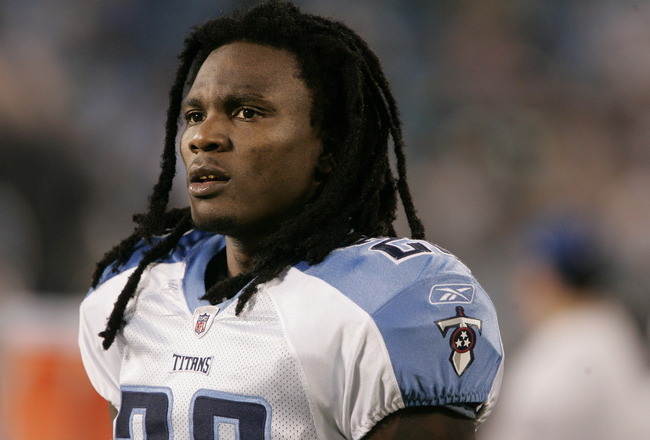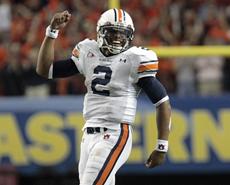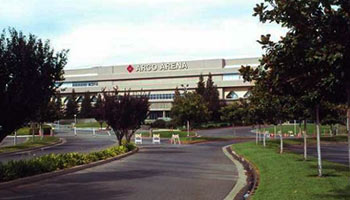by Timothy Weisberg | Aug 12, 2011 | Blog

Mary Ann Chastain/Getty Images
So the Tennessee Titans want to make running back Chris Johnson the highest paid running back in NFL history. Problem is, they are now willing after the 11th day of practice, and almost three weeks of training camp missed.
Johnson was the 24th overall pick in 2008, and has more rushing yards (4.568) than any other running back in the NFL over that span. Also, he was only the 6th player in NFL history to rush for over 2,000 yards in a season in 2008.
Still, the Titans felt compelled to pay him a base salary of $850,000, which was then reworked to a little over a million.
He has refused to report to camp until he gets a new contract, which is geared towards $30 million guaranteed.
Some call the Titans cheap and exploitative. Others call Johnson selfish and point that he is still under contract and should show up.
And yes. He should have showed up to training camp. But the Titans also should have paid him more and restructured the final two years remaining on his contract for more than a “measly” million dollars.
To us it comes off as selfish, but when you are one of only six players to rush for 2,000 yards, and lead the NFL in rushing yards over the past three seasons, I think you can make a point that Johnson is deserving of more than a 6-figure base salary.
Consider this: The Carolina Panthers recently gave DeAngelo Williams a five-year, $43 million dollar deal with $21 million guaranteed. Adrian Peterson of the Minnesota Vikings is set to make more than $10 million in the final year of his contract. And the St. Louis Rams’ Stephen Jackson landed a 6-year, $44 million deal in 2008.
Small market teams offer small market prices, but Carolina isn’t what you call a big market either.
We can try and put this in financial terms understandable to us. Let’s say the starting base salary for a marketing manager is $60,000 and you are making just that. Another manager at the firm has the same job and is making $600,000. Do you see something wrong with that?
Maybe not the best analogy, but marketing firms are incentive based, and salaries could fluctuate based on performance, similar to how players contribute and perform in the NFL.
But the fact does remain: Chris Johnson was under contract, agreed to the terms that raised his base salary to a little over a million dollars, and should have showed up for training camp.
The wrinkles could still be ironed out. But him not being in camp hurts the Titans, because Tennessee has a new coach, Mike Munchak.
Even Munchak agrees valuable times is missed when Johnson is sitting out.
“Even though he may come in in great shape, you are not getting the reads, you are not running behind the offensive line, you are not making your cuts,” Munchak told ESPN.com.
“All that kind of stuff is hard for any back to just come back and pick it up.”
Then again, it took the Titans almost three weeks into training camp to budge and decide on restructuring his contract.
It’s a double-edged sword hurting both parties. The Titans can talk the talk, but can they walk the walk?
If not, they might find Johnson sitting out even longer. He’s not bluffing either.
by Timothy Weisberg | Aug 3, 2011 | Blog

The Dodgers moved veteran shortstop Rafael Furcal (left) to the contending Cardinals while the Phillies acquired All-Star outfielder Hunter Pence (center) and the Giants added slugging outfielder Carlos Beltran to their lineup in the final days before the trade deadline. (Los Angeles Times/US Presswire/Getty Images)
The rich got richer (Philadelphia, San Francisco) and the Los Angeles Dodgers got poorer. For the first time in a while, Dodgers GM Ned Coletti was not a buyer, but a seller.
What was once a major stamp on major league baseball is bankrupt and out of playoff contention.
While the Phillies made moves for stars like Hunter Pence, the Dodgers resorted to menial deals, sending shortstop Rafael Furcal to the St. Louis Cardinals to save approximately $1.4 million in salary for prospects.
To make matters worse, Dodgers fans may have to witness the city by the bay up north hoisting a World Series Trophy while the Dodgers remain in limbo.
The Giants got Carlos Beltran from the New York Mets, Orlando Cabrera from the Cleveland Indians, and bolstered their infield more with the acquisition of Jeff Keppinger.
The Giants were buyers for a pennant race. The Dodgers: sellers and investors for a clouded and unclear future.
It might remain foggy and cold on the San Francisco peninsula, but the Giants envision another deep playoff run. The Dodgers envision a way to climb out of the cellar, battling San Diego for the embarrassingly contentious fifth place award.
But the Giants and Phillies have money, and not in the midst of serious financial instability. As the saying goes, the rich get richer and the poor get poorer.
But at least major league baseball stands for a microcosm of the U.S. economy: an elite few represent vast amounts of wealth (Giants, Phillies, Yankees), many are the middle of the pack (Rays, Braves, Diamondbacks, White Sox), and many live in poverty (Astros, Dodgers, Orioles).
The non-waiver trade deadline. Something that was non-existent for the Dodgers for a team that is, well, non-existent in terms of contenders.
As Marlon Brando famously said in the 1954 film On the Water Front, “I coulda been a contender.”
Bet Frank McCourt is muttering that over and over all the way to bankruptcy court.
by Timothy Weisberg | Aug 1, 2011 | Blog

End of an era-Carson Palmer would rather retire than play another year with the Bengals. (US Presswire)
Bengals qyuarterback Carson Palmer made headlines in January by demanding to be traded, or he would retire.
And the Cincinnati Bengals franchise chose the latter: don’t let the door hit you on the way out, Carson. With four years left on his contract, the Bengals were unwilling to give into his demands, and were justified in their actions.
I can understand wanting to leave Cincinnati, considering the franchise has had on two winning seasons the past two decades, but Palmer made a four-plus year commitment to the team.
It goes to show you once again that sports at the professional level is no longer a team sport. Rather, players egos get the best of them, whether it’s being unhappy about the team”s performance and demanding a trade, upset with their multi-million dollar contracts, or upset with coaching staff.
Bengals owner Mike Brown stood firm, and told it like it was in his decision not to trade Palmer.
“Carson (Palmer) signed a contract. He made a commitment. He gave his word,” Brown told ESPN.com. “We relied on his word. We relied on his commitment. We expected him to perform here. He’s going to walk away from his commitment. We aren’t going to reward him for it.”
And rightfully so. I could also understand if he was in the last year of his contract, but the reality is he has four years left on his contract. He made a commitment to represent the organization, and like any other professional sport, it is a business. You can’t expect ownership to take on the daunting task of trading away a franchise quarterback with millions and millions left on a four-year contract.
Palmer is not getting any younger, and at 32, will either have to rejoin the Bengals or wait until he is 36. The Bengals have moved on, focusing on draft pick Andy Dalton and attempting to sign another veteran quarterback as a mentor, that being former Raiders quarterback Bruce Gradkowski.
Not only is Palmer acting selfishly, but with an incredible sense of entitlement as a professional athlete. Demanding a trade is one thing, but retiring if your demands are not met is detrimental because you are officially giving up on your teammates.
But with millions in the bank, Palmer can enjoy retirement. Brown wasn’t bluffing and is moving on. Will Carson move on? Or will he report to camp weeks later and give in?
Either way, he has already let his teammates and the organization down. Safe to say his ego will let him down as well. Enjoy retirement. Now the Bengals have lost Palmer and Chad Ochocinco.
The team is worse, but at least that’s two less entitled people with inflated egos to deal with.
by Timothy Weisberg | Jul 30, 2011 | Blog

AP-Cam Newton was ruled eligible last season despite the NCAA finding his father Cecil to be involved in pay-for-play scheme.
The NCAA announced on July 26 that it would begin a review process that would expand the NCAA’s definition of an agent to include relatives, including parents.
While the NCAA Division I Amateurism Cabinet came up with the idea to close a loophole that kept Auburn quarterback Cam Newton eligible through the end of last season despite discovering his father, Cecil, was involved in a pay-for-play scheme, it appears to be more of an excuse to retract a precedent they clearly set by allowing Newton to play.
The NCAA set a precedent last year by allowing Newton to play: as long as the athlete put on the ear muffs and looked away, he could be shopped around like a prized possession at an auction by Tiffany’s.
And to make up for a major mistake by calling their decision a “loophole” is not only wrong, but offensive. Because of a blatant error and lapse in judgment involving Newton, other prospective athletes have to face the scrutiny of officials considering their own parents as agents.
Classifying parents as agents is not only controversial, but humanely wrong on so many levels. When you do this, you are implying that every parent is shopping their son/daughter around. That is clearly not the case, and should never be an assumption that is made. It is within the best interest of the prospective athlete, never the parent.
What makes matters worse is that the NCAA refuses to admit they made a mistake in the ruling of Cam Newton’s eligibility, and covering it up by calling their decision a “loophole” in the process.
The ruling set a precedent that could not be undone, but for the NCAA, covering up and hiding from your problems seems to be the natural solution.
Cecil Newton acted as an agent in every sense of the word. He asked Mississippi State for six-figure money if they expected Cam Newton to play in Starkville.
What should be taken into consideration is how they handled the case, and allowed Newton to continue playing.
According to the SEC bylaw 14.01.3.2: “If at any time before or after matriculation in a member institution a student-athlete or any member of his/her family receives or agrees to receive, directly or indirectly, any aid or assistance beyond or in addition to that permitted by the Bylaws of this Conference (except such aid or assistance as such student-athlete may receive from those persons on whom the student is naturally or legally dependent for support), such student-athlete shall be ineligible for competition in any intercollegiate sport within the Conference for the remainder of his/her college career.”
But he continued to play because the NCAA ruled Newton did not know of his father’s endeavors. Instead of reversing the decision and admitting wrongdoing, the NCAA feels compelled to cover up another cover up to cover it up some more: playing footsie with classifying relatives as agents to cover up a “loophole” as they deem it.
This isn’t expanding the definition of an agent: the SEC bylaw clearly states what an agent is. But leave it up to the NCAA to put the blame on somebody else but themselves for ignoring a clear rules violation.
The NCAA made it a “loophole.” If they had any intention on ruling Cam Newton ineligible, they would have. Instead, Newton led the Tigers to a National Championship and is now making millions in the NFL.
How’s that for a pay-for-play scheme?
by Timothy Weisberg | May 15, 2011 | Blog

Google Images
California’s state capital will boast a professional sports team for at least one more season.
The whole weight of Sacramento now rests on mayor Kevin Johnson’s shoulders. It’s too bad a former Mr. Olympian is no longer in office, because this is a ton of weight to carry.
“We spent 13 years and millions of dollars to try to get an arena built,” Kings co-owner Joe Maloof told ESPN.com. “We don’t have the answer. The mayor has the answers and we’re willing and able to listen. He’s got to have a plan. We never want to be untruthful to the fans of Sacramento. There is a sense of urgency, and that’s up to Mayor Johnson and his political team.”
Failed attempts at creating a plan for a new arena in Sacramento prompted the Kings to consider relocation…to Orange County? The Honda Center in Anaheim, Calif. is recently renovated with new luxury suites and planned renovations to the locker rooms in preparation for an NBA team 400 miles to the south.
A former NBA All-Star himself, Johnson attempts to mobilize a community that has not expected much from the organization over the past decade. The small market just got smaller, until it shrunk so much Maloof began to consider relocation.
The problem is that there is already a strong market, albeit a small market for the MLB’s Anaheim Angels and the NHL’s Anaheim Ducks, two teams that have seen great success the past decade.
Plus you have to worry about two NBA teams that dominate the gigantic Los Angeles market 30 miles to the north. And trust me. Pretending to be part of the market by calling yourself the Los Angeles (insert here) of Anaheim doesn’t make you a part of greater Los Angeles.
The Kings are coming off a 24-58 season, and a move from one small market to another is counterproductive.
The Sacramento Kings play at worn-down Arco Arena (or whatever they call it these days), and a young-laden team has lost the loyal fan base that once permeated the building with annoying cow bells.
But the 2002 Western Conference Finals marked the end of an era, because when the Lakers defeated the Kings in game seven in Sacramento to advance to the NBA Finals, the Lakers also tore away at the arena’s infrastructure.
The Kings have not made the playoffs since, and it is now hard to believe that the Kings were once a thriving franchise in a small market that drew 494 consecutive sellout games.
In fact, the Kings have been 137-273 (.334) the past five seasons, trailing only the Timberwolves (.268) for the lowest winning percentage in that span.
A certainly far cry from winning an NBA-best 61 games during the 2001-02 season.
The bonds in Anaheim are in place, but Maloof is willing to give the Sacramento community one more shot, one more opportunity. This opportunity may only come once in a lifetime, but it will take a very loyal and committed community to pass the measures needed to fund a new arena.
Let’s just hope that if worse comes to worse and the Kings are taken from the thrown in the state capital, they don’t turn to calling themselves the Los Angeles Kings of Anaheim. Or bettter yet: my version–The Sacramento former Arco Arena cowbell slingers of the Long Beach Aquarium of the Pacific of Orange County Royals somewhere near the city of Los Angeles Kings…of Anaheim.
by Timothy Weisberg | Apr 8, 2011 | Blog

A tarnished reputation is at best a weak euphemism to describe a career that fell from grace. Manny Ramirez announced he would be retiring from baseball, quite possibly opening up pandora’s box of deceit, betrayal and drugs of the Steroid Era.
They say when you hit rock bottom there is nowhere to go but go up, but in Ramirez’ case a second positive drug test in two seasons and anything worse is being six feet deep.
Ramirez tested positive on a drug test during spring training, and rather than face a 100-game suspension, decided to retire and close the book on a tumultuous MLB career.
“Major League Baseball recently notified Manny Ramirez of an issue under Major League Baseball’s Joint Drug Prevention and Treatment Program,” the MLB Commissioner’s Office said in a statement. “Rather than continue with the process under the Program, Ramirez has informed MLB that he is retiring as an active player. If Ramirez seeks reinstatement in the future, the process under the Drug Program will be completed.”
Ramirez’ quickly regained popularity when Boston parted ways with the slugger. trading him to the Dodgers on July 30, 2008. Ramirez performed well on the field, batting close to .400 down the stretch and becoming a fan favorite, as “Mannywood” signs quickly dispersed throughout Los Angeles.
But after signing a two-year, $45 million dollar deal, the popularity was short-lived when he tested positive in May 2009 and was suspended for 50 games.
Yet another bridge was burned, and Manny was claimed off waivers by the Chicago White Sox in August 2010.
Ramirez battled injuries all season, but still managed to bat .298 with nine home runs and 42 RBIs with the Dodgers and White Sox in 2010.
Ramirez signed a one-year, two million dollar deal with the Tampa Bay Rays this past off-season looking to revamp a recently tarnished career, but the damage done will see no relief.
Drug issues will ultimately be a stain Ramirez will be unable to wipe off.
Quite arguably one of the best hitters in the game with 556 career home runs will be another has-been from the Steroid Era.
A third positive test would ban him from baseball for life, but it only took two strikes for Ramirez to strike out and remain forever alienated from any Hall of Fame ballot.
Ramirez will not be remembered for “Manny being Manny.” He will not be remembered for diving in front of a cut off throw; he will not be remembered for heading into the Fenway Park scoreboard in left field to use the bathroom; and he will not be remembered for helping end the “Curse of the Bambino” while on the Red Sox 2004 World Series team.
Rather, Ramirez has permanently stamped his name on the blacklist roster that is growing at an alarming rate in the Steroid Era.
A .059 batting average with 0 HR and 1 RBI in five games with the Rays is what we will remember, not the .312 career batting average in 18-plus seasons.
“Manny being Manny.” Not this time. It’s Manny being blacklisted.






